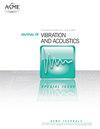Reformulation for the Solution of the Dynamic Response of Co-axial Segmented Beams
IF 1.9
4区 工程技术
Q2 ACOUSTICS
Journal of Vibration and Acoustics-Transactions of the Asme
Pub Date : 2022-09-27
DOI:10.1115/1.4055807
引用次数: 1
Abstract
Stepped beams constitute an important class of engineering structures whose vibration response has been widely studied. Many of the existing methods for studying stepped beams manifest serious numerical difficulties as the number of segments or the frequency of excitation increase. In this paper, we focus on the Transfer Matrix Method (TMM), which provides a simple and elegant formulation for multi-step beams. The main idea in the TMM is to model each step in the beam as a uniform element whose vibration configurations are spanned by the segment's local eigenfunctions. Utilizing these local expressions, the boundary conditions at the ends of the multi-step beam as well as the continuity and compatibility conditions across each step are used to obtain the nonlinear eigenvalue problem. Also, and perhaps more importantly, we provide a reformulation for multi-step Euler-Bernoulli beams that avoids much of the numerical singularity problems that have plagued most of the earlier efforts. When this reformulation is extended to multi-segment Timoshenko beams, the numerical difficulties appear to be mitigated, but not solved.同轴分段梁动力响应解的重新表述
阶梯式梁是一类重要的工程结构,其振动响应得到了广泛的研究。随着段数的增加或激励频率的增加,许多现有的阶梯梁研究方法都出现了严重的数值困难。本文重点讨论了传递矩阵法(TMM),它为多阶梁提供了一个简单而优雅的公式。TMM的主要思想是将梁中的每一步建模为均匀单元,其振动配置由段的局部特征函数跨越。利用这些局部表达式,利用多阶梁两端的边界条件以及各阶间的连续性和相容性条件,得到了非线性特征值问题。此外,也许更重要的是,我们提供了一个多步欧拉-伯努利梁的重新表述,避免了许多困扰大多数早期努力的数值奇点问题。当这种重新表述推广到多段Timoshenko梁时,数值上的困难似乎有所减轻,但没有解决。
本文章由计算机程序翻译,如有差异,请以英文原文为准。
求助全文
约1分钟内获得全文
求助全文
来源期刊
CiteScore
4.20
自引率
11.80%
发文量
79
审稿时长
7 months
期刊介绍:
The Journal of Vibration and Acoustics is sponsored jointly by the Design Engineering and the Noise Control and Acoustics Divisions of ASME. The Journal is the premier international venue for publication of original research concerning mechanical vibration and sound. Our mission is to serve researchers and practitioners who seek cutting-edge theories and computational and experimental methods that advance these fields. Our published studies reveal how mechanical vibration and sound impact the design and performance of engineered devices and structures and how to control their negative influences.
Vibration of continuous and discrete dynamical systems; Linear and nonlinear vibrations; Random vibrations; Wave propagation; Modal analysis; Mechanical signature analysis; Structural dynamics and control; Vibration energy harvesting; Vibration suppression; Vibration isolation; Passive and active damping; Machinery dynamics; Rotor dynamics; Acoustic emission; Noise control; Machinery noise; Structural acoustics; Fluid-structure interaction; Aeroelasticity; Flow-induced vibration and noise.

 求助内容:
求助内容: 应助结果提醒方式:
应助结果提醒方式:


